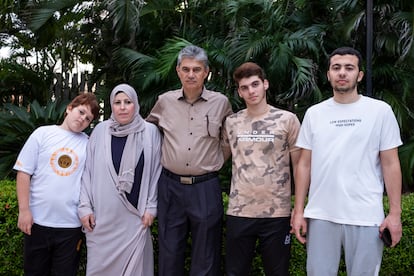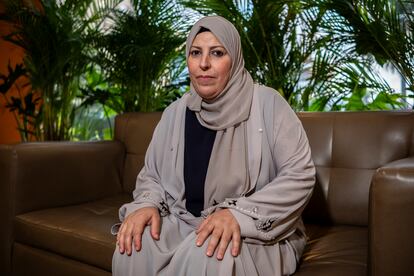Rescued from Gaza, Colombia offers Palestinian family a new life in Barranquilla
A decree by President Gustavo Petro allowed the Almassri family to be evacuated from the war zone in the Strip and granted them Colombian nationality

As the first Israeli bombs fell on Gaza, Basel Zaid El Sahli found himself far away from his family. He was in Cairo for a surgical procedure. His wife and children were in Khan Yunis, in the south of the Strip, caught in the middle of the war. He didn’t know what to do. Due to the power outages in Gaza, he could barely communicate with his family. Anguish consumed Zaid El Sahli. A month later and after knocking on many doors, Colombian President Gustavo Petro opened one that, in his opinion, saved their lives.
With decree 1997 of November 21, the president naturalized Zaid El Sahli’s wife, Samaher Ali Zaiyd Almassri. The ruling was processed in record time and allowed the family to be repatriated. It was a previously remote possibility: despite the fact that Zaid El Sahli and his children hold dual Palestinian and Colombian nationality, his wife did not. With Petro’s decision, the Almassri family were able to fly together with the little they had left and landed in a city on the other side of the world: Barranquilla.
The eldest of the children, Mohammed Al-Masry, 21, is in charge of talking to the press. He is the only one of the family who, in addition to Arabic, speaks some English. He remembers nostalgically what his life was like before the Hamas attacks on October 7. He explains that they did not live a luxurious lifestyle and supported themselves with the income obtained from their father’s farm, while their mother dedicated herself to household work. He studied technology at the Islamic University of Gaza, the largest in the region and renowned in the Arab world.
Only memories remain. The university was bombed in early November after Israel alleged that Hamas militiamen were training there. Not a single wall of their house remains standing. The young man explains that, when his mother and brothers had to flee, they took only the clothes they were wearing. “People in Gaza are waiting for the day of their death,” Mohammed tells EL PAÍS.

Petro’s support for Palestine
Although Zaid El Sahli is of Colombian origin, he only lived in Barranquilla for three years before returning to Palestine. What he knows about the country comes from stories his Colombian grandparents told him years ago. Laughing, he remembers what they said about the suffocating heat in his native department of Atlántico. What he never imagined was that this would be where he would have to start again from scratch. But he sounds optimistic: he wants his children to study there. The family’s final days in Khan Younis were traumatic. “We returned to the time of the caves. The only way to move was by camel because there was no fuel. There is nothing left in Gaza. They destroyed everything,” he says.
Petro’s decision did not come as a surprise. Since the outset of the conflict, he has published many messages of support for the Palestinian people. He has gone head-on against the Israeli offensive and has taken diplomatic measures that have earned him both criticism and applause. A week ago, he announced that he would apply to the United Nations for Palestine to become a full member and he had previously stated that he would open an embassy in Ramallah, the administrative capital of Palestine in the West Bank. He also called his ambassador in Israel for consultations a few weeks ago. “Colombia does not support genocides,” he said on his X account.
For the Almassri family, the Colombian president’s determined support has saved them from the fates being suffered by friends and family in Gaza. “Dead, or wounded for days without medicine because there is not enough supply in the area,” explains Mohammed. Father and son express their gratitude to the entire Colombian diplomatic mission, and to the Arab community in Colombia, Egypt, and Israel.
Barranquilla has a huge Palestinian diaspora that arrived in the region at the beginning of the 20th century. Many people landed in the Caribbean after fleeing the conflict in the Middle East and taking advantage of the port, where they could develop their commercial skills. Over the years, they even made a place for themselves among Caribbean high society. So much so that currently people from the diaspora occupy spaces and positions of power in the social, political, academic, and cultural life of the country. The Palestinian ambassador to Colombia, Rauf Al Malki, estimates that there are at least 100,000 Colombians of Palestinian origin.
Mohammed, although thousands of miles away and in another time zone, refuses to ignore what his people are going through. Throughout the interview he emphasizes that it is not necessary to be an Arab to be informed and show solidarity. Using a web translation tool, he takes his first steps in digital activism. He has created a profile on the social network X that reads: “Palestinian-Colombian, survivor of the Israeli genocide in Gaza, fighting for a Palestine without occupation and apartheid.” He already has more than 300 followers and has posted some photos of Barranquilla, close to the sea like his native Gaza, which will not allow him to forget his home.
Sign up for our weekly newsletter to get more English-language news coverage from EL PAÍS USA Edition
Tu suscripción se está usando en otro dispositivo
¿Quieres añadir otro usuario a tu suscripción?
Si continúas leyendo en este dispositivo, no se podrá leer en el otro.
FlechaTu suscripción se está usando en otro dispositivo y solo puedes acceder a EL PAÍS desde un dispositivo a la vez.
Si quieres compartir tu cuenta, cambia tu suscripción a la modalidad Premium, así podrás añadir otro usuario. Cada uno accederá con su propia cuenta de email, lo que os permitirá personalizar vuestra experiencia en EL PAÍS.
¿Tienes una suscripción de empresa? Accede aquí para contratar más cuentas.
En el caso de no saber quién está usando tu cuenta, te recomendamos cambiar tu contraseña aquí.
Si decides continuar compartiendo tu cuenta, este mensaje se mostrará en tu dispositivo y en el de la otra persona que está usando tu cuenta de forma indefinida, afectando a tu experiencia de lectura. Puedes consultar aquí los términos y condiciones de la suscripción digital.









































